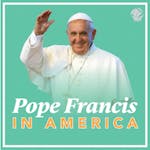
When House Speaker John Boehner invited Israeli Prime Minister Benjamin Netanyahu to address Congress earlier this year in opposition to the emerging deal to curb Iran's nuclear capability, the all-but-explicit partisan purpose was to exploit the tension between the fact that most American Jews are Democrats and that Democrats were acting at cross purposes with the leader of Israel. That gambit failed to derail the agreement, but it succeeded beyond all expectations at bringing that tension to light.
Boehner’s purpose in inviting Pope Francis to address Congress this week was nothing like that. But the effect might turn out to be similar—except this time it will be at his own party’s expense.
Consider the timing of Francis’s visit, which happens to coincide with an outburst of Islamophobia within the Republican Party. The flareup began last week when Donald Trump placated an anti-Muslim bigot at a campaign event in New Hampshire, and exploded over the weekend when Ben Carson, who’s battling it out for second place in the Republican primary, said he thinks Muslims are unfit for the presidency, and out of step with the U.S. Constitution.
Francis, by contrast, has rejected Christian intolerance of Islam. He considers the Koran to be no less a spiritual tome than the Bible, and condemns those who equate Islam with violence. As if to troll the entire American right, he quoted a Muslim poet in his climate change encyclical, which is a moral call to action Republicans overwhelmingly oppose.
This is the quality that makes Francis’s visit to Washington such a potent and disorienting political moment. The Republican Party quite understandably conceives of itself as a political home for Christian co-religionists in the U.S. And while American Catholics are not a monolithically conservative voting bloc, Republicans offer them an unflinching commitment to certain Catholic values rooted in shared dogmas. Boehner is a committed, conservative Catholic. Representative Paul Ryan is a committed, conservative Catholic. That they are key leaders of the Republican Party reflects this partisan self-conception.
Francis is extremely adept at revealing the extent to which Republicanism is a political entity way over and above a religious one—and in many ways, an entity that exploits religion to advance secular ends. It’s possible that Francis will not touch off a confrontation with Republicans over its hospitality to Islamophobes. But even before Francis arrived, Republicans began guarding themselves at the many places the Pope’s relatively liberal views make them vulnerable to losing the pious high ground.
Republicans are chiefly alarmed at the likelihood that Francis will beseech Congress (and thus implicitly congressional Republicans) to address climate change with aggressive policy interventions.
“Media reports indicate His Holiness instead intends to focus the brunt of his speech on climate change,” wrote Arizona Representative Paul Gosar, who will boycott Francis’s speech, “a climate that has been changing since first created in Genesis. More troubling is the fact that this climate change talk has adopted all of the socialist talking points, wrapped false science and ideology into ‘climate justice’ and is being presented to guilt people into leftist policies. If the Pope stuck to standard Christian theology, I would be the first in line. If the Pope spoke out with moral authority against violent Islam, I would be there cheering him on. If the Pope urged the Western nations to rescue persecuted Christians in the Middle East, I would back him wholeheartedly. But when the Pope chooses to act and talk like a leftist politician, then he can expect to be treated like one.”
With respect to every issue Gosar listed, Francis embodies the fact that Republican nostrums aren’t entirely coterminous with “Christian theology.” Francis comes to the U.S. from Cuba, months after concluding an instrumental role facilitating the normalization of relations between the two countries. He supports the anti-proliferation deal with Iran. At a time when Republicans are aggressively yanking their immigration consensus to the right, Francis preaches support for liberal immigration policy, and toleration of immigrant families.
Republicans expect Francis’s visit to lend moral weight to their crusade to defund Planned Parenthood, which they renewed after anti-abortion advocates drew attention to the organization’s methods of providing biomedical researchers with aborted fetal tissue. The U.S. Conference of Catholic Bishops has come down clearly in opposition to government-supported aborted fetal tissue research, and the expectation is that Francis opposes it as well. But it’s unclear whether Francis sees anything redemptive in using tissue that has already been aborted in the service of curing disease, let alone whether he supports conditioning billions of dollars in annual anti-poverty appropriations on ending federal funding for Planned Parenthood. It’s likely that he differs from Republicans on that point as well, which means it’s possible that by the end of his visit, Francis will have complicated rather than augmented the GOP’s anti-abortion strategy.
The fact that a Catholic leader of the Republican Party is welcoming Francis to Capitol Hill reflects the fact that the Pope's idiosyncratic views haven't polarized Catholicism in the same way that Netanyahu's politics have polarized American liberals and conservatives over Israel's national security. But his visit is no less potent a reminder of how quickly politically neutral concepts can become cudgels in the U.S. now that the ideological overlap between its two main political parties has disappeared.
